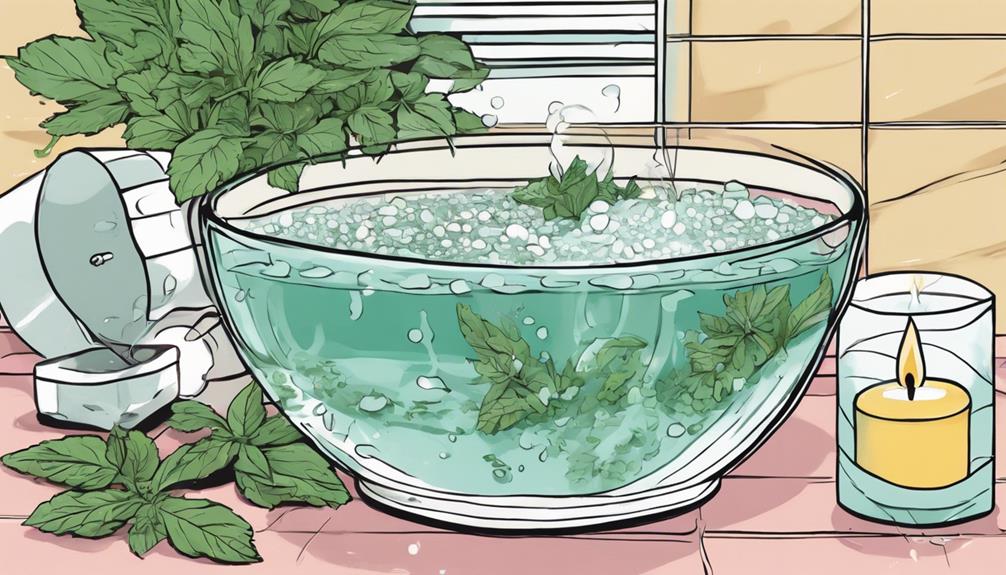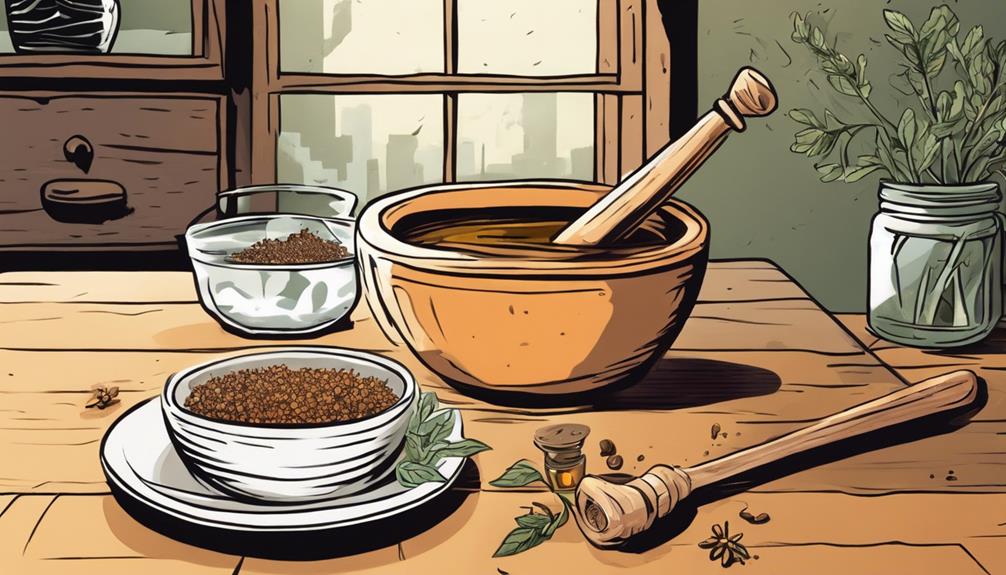If you're dealing with a toothache, try some effective natural remedies from your home. Crush garlic to release its antibacterial properties, or apply clove oil directly for its numbing effects. A simple saltwater rinse helps reduce inflammation and disinfect your mouth. You can also use cold compresses for pain relief. Peppermint tea bags offer a soothing sensation, perfect for calming sensitive gums. If you're interested in a well-rounded approach, there are plenty more tips and tricks to explore that can help you manage tooth pain effectively.
Key Takeaways
- Clove Oil: Apply directly to the affected area for its anesthetic properties and to reduce inflammation caused by toothache.
- Garlic: Crush and apply to the painful tooth to utilize its antibacterial properties and pain-relieving allicin.
- Saltwater Rinse: Mix ½ teaspoon of salt in warm water to disinfect, reduce inflammation, and loosen debris in your mouth.
- Cold Compress: Use a cold pack on the cheek for 15-20 minutes to numb pain and reduce swelling in the affected area.
Home Remedies Overview

Home remedies for toothaches can provide effective relief using natural ingredients readily found at home. For adults, a simple saltwater rinse or a clove oil application can help alleviate the pain and discomfort associated with a toothache. These natural remedies have been used for generations and are known for their soothing effects on oral pain. When it comes to natural toothache remedies for kids, a cold compress against the cheek or a small amount of diluted peppermint oil can be effective in providing relief without the need for over-the-counter medications. It’s important to consult with a dentist if the pain persists or worsens, but these home remedies can be a helpful first step in managing toothache discomfort.
When you're dealing with a toothache, you might want to take into account using garlic. Its potent antibacterial properties can help combat infection, while clove oil, thanks to eugenol, offers anesthetic effects that can numb your pain. A simple saltwater rinse, made by mixing ½ teaspoon of salt in warm water, can also help reduce inflammation and promote healing.
Applying a cold compress to your cheek for 15-20 minutes can alleviate pain and swelling by constricting blood vessels around the affected area. If you prefer something soothing, try using peppermint tea bags. Whether cooled or warm, they can provide relief by calming sensitive gums and numbing tooth pain due to menthol's cooling properties.
Additionally, diluted hydrogen peroxide can serve as a mouthwash, killing bacteria and reducing plaque. It can also aid in healing bleeding gums when used correctly.
These home remedies not only target the discomfort but also work to address underlying issues, giving you a natural path to relief from your toothache.
Effective Rinses

Effective rinses can provide immediate relief from toothache discomfort while promoting oral health through natural ingredients.
One popular method is the saltwater rinse, where mixing 1/2 teaspoon of salt in 8 ounces of warm water helps reduce inflammation and loosen debris.
Alternatively, a hydrogen peroxide rinse made from equal parts of 3% hydrogen peroxide and water acts as a disinfectant, killing bacteria and aiding in the healing of bleeding gums.
You might also try a peppermint tea rinse. Steeping peppermint tea bags in hot water creates a soothing mouthwash, thanks to menthol's numbing properties.
For a more intense approach, consider a clove oil rinse; diluting clove oil with water offers a natural anesthetic effect to relieve tooth pain and reduce inflammation.
Lastly, a guava leaf rinse is another effective option. Boiling crushed guava leaves releases their antibacterial properties, providing relief from toothache while promoting overall oral health.
Natural Pain Relievers

While rinses can provide immediate relief, exploring natural pain relievers like clove oil and garlic can offer additional comfort for toothaches.
Clove oil is particularly effective, as it contains eugenol, a natural anesthetic that numbs tooth pain and reduces inflammation when applied directly to the affected area. You'll find that a few drops can make a significant difference.
Garlic is another powerful remedy. When crushed, it releases allicin, which has antibacterial properties that help alleviate pain and combat oral infections. Simply apply the crushed garlic to the painful tooth for relief.
Don't overlook peppermint tea, either. Its menthol content provides a cooling effect that soothes aching teeth and gums. You can swish the tea around your mouth or use a cooled tea bag for direct application.
Additionally, a saltwater rinse serves as a natural disinfectant. Mix ½ teaspoon of salt in warm water to help reduce inflammation and loosen food particles.
Lastly, hydrogen peroxide can act as a mouthwash, killing bacteria and reducing plaque. Dilute it with equal parts water for temporary pain relief while promoting oral health.
These natural remedies can truly help ease your discomfort.
Soothing Compresses

When you're dealing with a toothache, soothing compresses can make a real difference.
A cold compress helps numb the pain, while a warm one relaxes your jaw muscles.
Alternating between the two can provide the relief you need until you can see a dentist.
Cold Compress Application
Applying a cold compress to the outside of your cheek for 15-20 minutes can numb the pain and reduce swelling caused by a toothache. The cold temperature constricts blood vessels, helping alleviate pain and inflammation in the affected area. You can use an ice pack wrapped in a cloth to avoid direct contact with your skin, which reduces the risk of frostbite.
For best results, reapply the cold compress every few hours as needed, particularly during the first 24-36 hours of tooth pain. This method provides immediate, non-invasive relief from a toothache while you're waiting for dental treatment or when discomfort strikes.
| Steps to Apply Cold Compress | Tips for Effective Use | Benefits of Cold Compress |
|---|---|---|
| 1. Gather an ice pack. | Use a cloth to wrap the ice. | Numbs the area for temporary relief. |
| 2. Apply it to your cheek. | Limit application to 15-20 mins. | Helps reduce swelling and inflammation. |
| 3. Reapply every few hours. | Monitor skin for frostbite. | Quick relief from acute pain. |
| 4. Focus on the affected area. | Stay relaxed while applying. | Non-invasive and easy to do. |
| 5. Consult a dentist if pain persists. | Keep the area clean. | Effective in managing discomfort. |
Peppermint Tea Benefits
After using a cold compress to numb tooth pain, consider peppermint tea as another effective remedy that can provide soothing relief. The menthol in peppermint tea offers a cooling sensation that can help soothe toothache pain when swished around your mouth. Its anti-inflammatory properties work wonders to reduce swelling and discomfort in your gums, making it an ideal choice during a toothache.
To maximize its benefits, you can use a cooled peppermint tea bag as a compress on the affected area. This method not only numbs the pain but also calms inflammation, providing immediate relief. Additionally, peppermint tea boasts antimicrobial effects, combating bacteria in your mouth and promoting overall oral health.
Drinking peppermint tea can also freshen your breath, giving you dual benefits for your oral hygiene. By incorporating peppermint tea into your toothache relief routine, you can effectively alleviate pain while supporting your mouth's health. Whether you sip on it or use it as a compress, peppermint tea is a simple yet powerful remedy to help you through a tough toothache.
Clove Oil Usage
Clove oil serves as an effective soothing compress for toothaches, thanks to its natural anesthetic properties that numb pain and reduce inflammation.
To use it, dilute 15 drops of clove oil in one ounce of a carrier oil, like coconut or olive oil. This dilution helps prevent gum irritation when you apply the compress.
Once mixed, soak a cotton ball in the solution and gently apply it to the affected area. The clove oil not only numbs pain but also boasts antibacterial properties, helping to combat oral infections and promote overall oral health.
For temporary relief, you can repeat this process throughout the day, placing the compress directly on the painful tooth or gum area.
Keep in mind that clove oil is potent, so use it sparingly to avoid potential side effects, such as gum irritation or allergic reactions, especially if you're sensitive.
Dietary Considerations

When dealing with a toothache, it's important to know which foods to avoid to prevent worsening your pain.
You should focus on nutrient-rich options that support healing and remember to stay hydrated for ideal oral health.
Making these dietary adjustments can help you manage discomfort while promoting recovery.
Foods to Avoid
To ease toothache discomfort, steer clear of sugary and acidic foods that can worsen your pain and sensitivity. Sugar promotes the growth of bacteria, leading to tooth decay and increasing your discomfort. Acidic foods, like citrus fruits and vinegar, can weaken tooth enamel, making sensitivity even more pronounced.
Additionally, avoid hard foods such as nuts and hard candies, as they can irritate sensitive teeth or cause further damage to compromised dental structures. Starchy foods, including chips and bread, tend to get trapped between your teeth, contributing to plaque buildup and potential tooth decay.
Hot foods and beverages are also best avoided since they can trigger increased sensitivity in affected areas, exacerbating your pain. By steering clear of these problematic foods, you can help manage your toothache more effectively and reduce the risk of further dental issues.
Prioritizing your oral health is vital during this time, so make conscious decisions about what you eat to alleviate discomfort and promote healing.
Nutrient-Rich Options
Incorporating nutrient-rich foods into your diet can greatly support your oral health and help alleviate toothache discomfort.
Start by including foods high in calcium, like dairy products, leafy greens, and almonds. These can strengthen your tooth enamel and reduce the risk of cavities.
Omega-3 fatty acids, found in fatty fish like salmon and walnuts, possess anti-inflammatory properties that may reduce gum inflammation, ultimately helping to reduce pain.
Filling your plate with antioxidants from fruits and vegetables, such as berries, citrus, and spinach, can combat oxidative stress and inflammation, promoting better oral health.
Don't forget about probiotics; foods like yogurt and kefir can foster a healthy balance of oral bacteria, reducing the risk of tooth decay and gum disease.
To combat tooth sensitivity, aim to incorporate these nutrient-rich options into your meals regularly.
Maintaining a healthy balance of these foods can support your overall oral health and may prevent future toothaches.
Hydration Importance
Hydration plays an essential role in maintaining your oral health by ensuring adequate saliva production, which helps wash away food particles and neutralize harmful acids.
Without enough hydration, you're at risk of dry mouth, increasing your chances of tooth decay and painful toothaches.
Here are some key ways to boost your hydration:
- Drink Plenty of Water: Aim for at least eight glasses a day to keep your saliva flowing and combat dry mouth.
- Choose Herbal Teas: Opt for unsweetened herbal teas that hydrate while offering anti-inflammatory benefits, which can soothe oral discomfort.
- Snack on Fruits and Vegetables: Incorporate water-rich options like cucumbers and oranges, as they provide hydration and essential vitamins for oral health.
- Limit Sugary Beverages: Cut back on sodas and sugary drinks that can lead to tooth decay and inflammation in your mouth.
Importance of Oral Hygiene

Maintaining good oral hygiene is essential for preventing toothaches and ensuring long-term dental health. You should brush your teeth twice daily with fluoride toothpaste, as this greatly reduces the risk of cavities and gum disease—two common causes of toothaches.
Don't forget to floss daily, too; it removes food particles and plaque from between your teeth, preventing harmful buildup that can lead to decay. Incorporating an antibacterial mouthwash into your routine can further protect your mouth by eliminating bacteria that could cause dental infections.
Regular dental check-ups every six months are vital as well; these visits help detect potential dental problems early, allowing for timely intervention before pain develops.
Moreover, be mindful of your diet. Eating foods low in sugar and acid can greatly decrease the risk of enamel erosion and cavities, contributing to better overall oral health.
When to Seek Professional Help

If your toothache lasts more than two days despite trying home remedies, it's time to see a dentist. Ignoring persistent pain can lead to serious complications, especially if there's an underlying problem.
Here are some key signs that indicate you should seek professional evaluation:
- Signs of infection: If you notice swelling, fever, or discharge from your gums, don't wait. These symptoms require immediate dental attention.
- Severe sensitivity: Worsening sensitivity to hot or cold may point to deeper dental issues that need assessment by a professional.
- Visible damage: Chips or cracks in your teeth aren't just cosmetic concerns. They can lead to further complications, so it's crucial to get them evaluated.
- Frequent episodes: If you regularly experience toothaches or sensitivity, it's time to address these chronic dental issues with a dentist.
Taking these signs seriously can prevent more severe problems down the line.
Lifestyle Tips for Prevention

To keep toothaches at bay, adopting a proactive lifestyle focused on prevention is key. Start by practicing good oral hygiene. Brush twice daily with fluoride toothpaste and floss every day to prevent plaque buildup and tooth decay. Don't forget to schedule biannual dental checkups; these visits help identify potential issues early, ensuring they're addressed before becoming serious problems.
Your diet plays a vital role too. Opt for a balanced diet rich in fruits, vegetables, and whole grains while limiting sugary and acidic foods that contribute to tooth decay and enamel erosion. Drinking plenty of water is essential; it helps rinse away food particles and bacteria, promoting overall oral health and hydration.
If you have sensitive teeth, talk to your dentist about dental sealants. These protective coatings can be applied to the chewing surfaces of back teeth, greatly reducing the risk of cavities, especially in children and teenagers.
Summary of Remedies

Explore a variety of natural remedies that can effectively relieve toothache pain and promote healing. These methods not only provide immediate relief but also help maintain your overall dental health. Here's a summary of effective remedies you can try:
- Clove Oil: This natural anesthetic contains eugenol, which numbs pain and reduces inflammation when applied directly to the affected area.
- Garlic: Known for its antibacterial properties, crushed garlic can be placed on the tooth to fight infection and alleviate pain.
- Saltwater Rinse: Mix 1/2 teaspoon of salt in warm water for a natural disinfectant. This rinse helps reduce swelling and promotes healing.
- Peppermint Tea: A cooled peppermint tea bag can soothe your gums and provide a numbing effect, making it a calming remedy for discomfort.
Additionally, consider using a hydrogen peroxide rinse. Dilute 3-percent hydrogen peroxide with equal parts water to kill bacteria and reduce plaque buildup.
These natural remedies can effectively address your toothache, allowing you to find relief while promoting healing.
Frequently Asked Questions
How to Stop Toothache Pain Fast?
To stop toothache pain fast, try rinsing your mouth with warm saltwater, applying a cold compress, or using clove oil directly on the tooth. These remedies can provide quick relief from discomfort and inflammation.
What's the Best Natural Thing for a Toothache?
When you're looking for the best natural remedy for a toothache, clove oil's eugenol can numb pain effectively. You might also try garlic, saltwater rinses, or peppermint tea bags for soothing relief.
How Do You Stop Nerve Pain in Your Tooth Asap?
To stop nerve pain in your tooth ASAP, try rinsing with saltwater, applying a cold compress, or using clove oil directly on the tooth. These methods can provide immediate relief and help reduce inflammation.
What Is the Strongest Natural Antibiotic for Toothache?
Imagine a shield against pain; garlic stands tall as a natural antibiotic. Its allicin fights bacteria fiercely, while clove oil and peppermint join the battle, soothing and protecting your mouth from unwelcome invaders.
Conclusion
So, next time you find yourself in the throes of a toothache, remember: who needs a dentist when you've got cloves and salt water?
Just embrace your inner herbalist and let nature work its “magic.” After all, why would you want to spend money on a professional when you can swish around some vinegar and hope for the best?
But seriously, if your tooth is trying to stage a rebellion, it's probably time to call in the experts.









